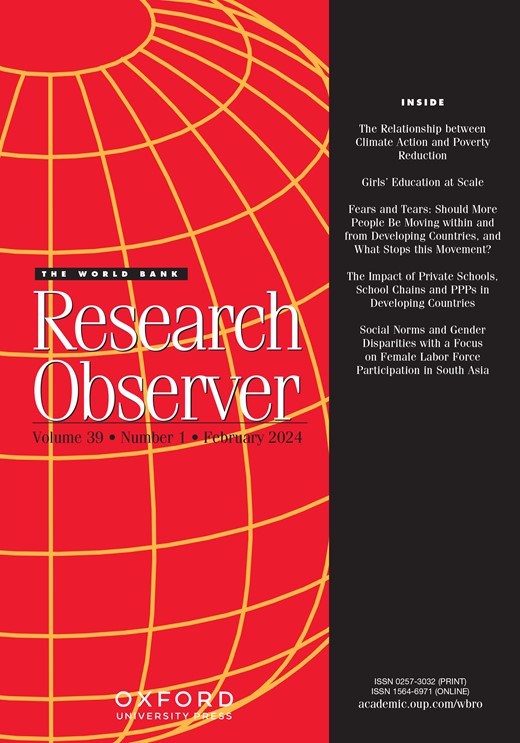Social Norms and Gender Disparities with a Focus on Female Labor Force Participation in South Asia
IF 3.3
1区 经济学
Q1 DEVELOPMENT STUDIES
引用次数: 0
Abstract
Abstract Despite decades of economic growth, gender disparities in South Asia remain remarkably high. Although not the only one, social norms are a crucial driver of various gender outcomes, including differential economic participation. Using repeated cross-sectional data from nationally representative surveys, this study explores long-term trends across gender outcomes and social norms (contrasting attitudes and social normative expectations towards gender roles) in South Asia. The results corroborate the evidence that there has been almost no progress in gender disparities in South Asia over the past half-century. There has been little progress in female labor force participation, age at first birth, agency, and intimate partner violence, while (basic) education is an important exception. The lack of progress is apparent among all layers of society, including women who live in urban areas, are educated, and have higher incomes. Gender attitudes also remain unchanged, while for some issues, they have become more conservative and have a negative relationship with gender outcomes. This negative relationship is even stronger when social normative expectations are considered. More data on social norms and a better understanding of their constraining role may be critical for achieving gender equality in the region.社会规范和性别差异——以南亚女性劳动力参与为重点
尽管经历了几十年的经济增长,但南亚的性别差距仍然非常大。虽然不是唯一的原因,但社会规范是各种性别结果的关键驱动因素,包括不同的经济参与。本研究利用来自全国代表性调查的重复横断面数据,探讨了南亚地区性别结果和社会规范(对性别角色的对比态度和社会规范期望)的长期趋势。研究结果证实了过去半个世纪南亚在性别不平等方面几乎没有任何进展的证据。在女性劳动力参与、第一胎年龄、代理和亲密伴侣暴力方面进展甚微,而(基础)教育是一个重要的例外。缺乏社会的进步是明显的在所有层,包括妇女住在城市地区,是受过良好教育,有较高的收入。性别态度也保持不变,而对于一些问题,他们变得更加保守,有负与性别关系的结果。当考虑到社会规范期望时,这种负相关关系甚至更强。更多关于社会规范的数据和更好地了解其制约作用可能对实现该区域的性别平等至关重要。
本文章由计算机程序翻译,如有差异,请以英文原文为准。
求助全文
约1分钟内获得全文
求助全文
来源期刊

World Bank Research Observer
Multiple-
CiteScore
12.60
自引率
1.20%
发文量
8
期刊介绍:
The World Bank Journals, including the Research Observer, boast the largest circulation among economics titles. The Research Observer is distributed freely to over 9,100 subscribers in non-OECD countries. Geared towards informing nonspecialist readers about research within and outside the Bank, it covers areas of economics relevant for development policy. Intended for policymakers, project officers, journalists, and educators, its surveys and overviews require only minimal background in economic analysis. Articles are not sent to referees but are assessed and approved by the Editorial Board, including distinguished economists from outside the Bank. The Observer has around 1,500 subscribers in OECD countries and nearly 10,000 subscribers in developing countries.
 求助内容:
求助内容: 应助结果提醒方式:
应助结果提醒方式:


